Paul Mescal steps into Russell Crowe’s Roman sandals (and bites a baboon!?) in Gladiator II
It’s the wildest scene in Gladiator II and Paul Mescal, chosen for the epic sequel by Ridley Scott, told the legendary director exactly what he thought when he read it - ‘like, what the f...?’
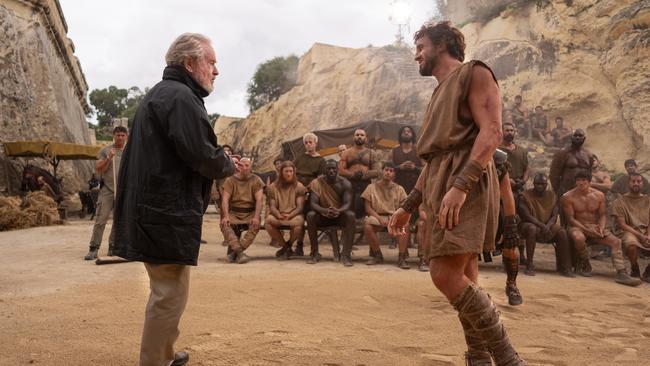
Let us turn our attention to Paul Mescal’s nose. Much has been written about the face of the 28-year-old actor from County Kildare, Ireland: his sad, soulful eyes and his playful tangle of curls. But for the purposes of this story, Mescal’s nose is the thing. A steep, elegant plane, it is so aquiline, so patrician, that Mescal was teased endlessly about it when he was a teenager. As is often the case with adolescent ribbing, the actor is having the last laugh. “The thing that was the bane of my life when I was in secondary school is one of the main reasons that I’m in Gladiator II,” Mescal grins. “So I’m delighted with my mother’s side of the genetics.”
So praetorian is his profile, it is almost ludicrous that the plot of Gladiator II – the sequel to the Oscar-winner starring Russell Crowe that’s been almost a quarter of a century in the making – hinges on Mescal in disguise. He stars as Lucius, son of Lucilla (Connie Nielsen, reprising her role as daughter of the late emperor Marcus Aurelius). Sent to Africa as a boy and now enslaved as a man, Lucius is forced to fight for his freedom, and the fate of Rome itself, in the same coliseum where he once watched a gladiator defy a corrupt emperor (Joaquin Phoenix). For much of the film, Mescal’s Lucius goes undetected, because everyone – Lucilla, her new warrior husband (Pedro Pascal), the scheming gladiator master Macrinus (Denzel Washington) and a pair of nasty emperors (Joseph Quinn and Fred Hechinger) – believes him dead. But at one point, Lucilla addresses an enormous marble bust of her father and the thing might as well be a statue to the character of Connell from Normal People, Mescal’s breakout role; such is the resemblance. Lucius is so clearly the prince of Rome: grandson to a murdered emperor, husband to a murdered wife. And he will have his vengeance, in this life or the next.
WATCH: How Harry Gregson-Williams stepped into the shoes of Hans Zimmer to create the score of Gladiator II
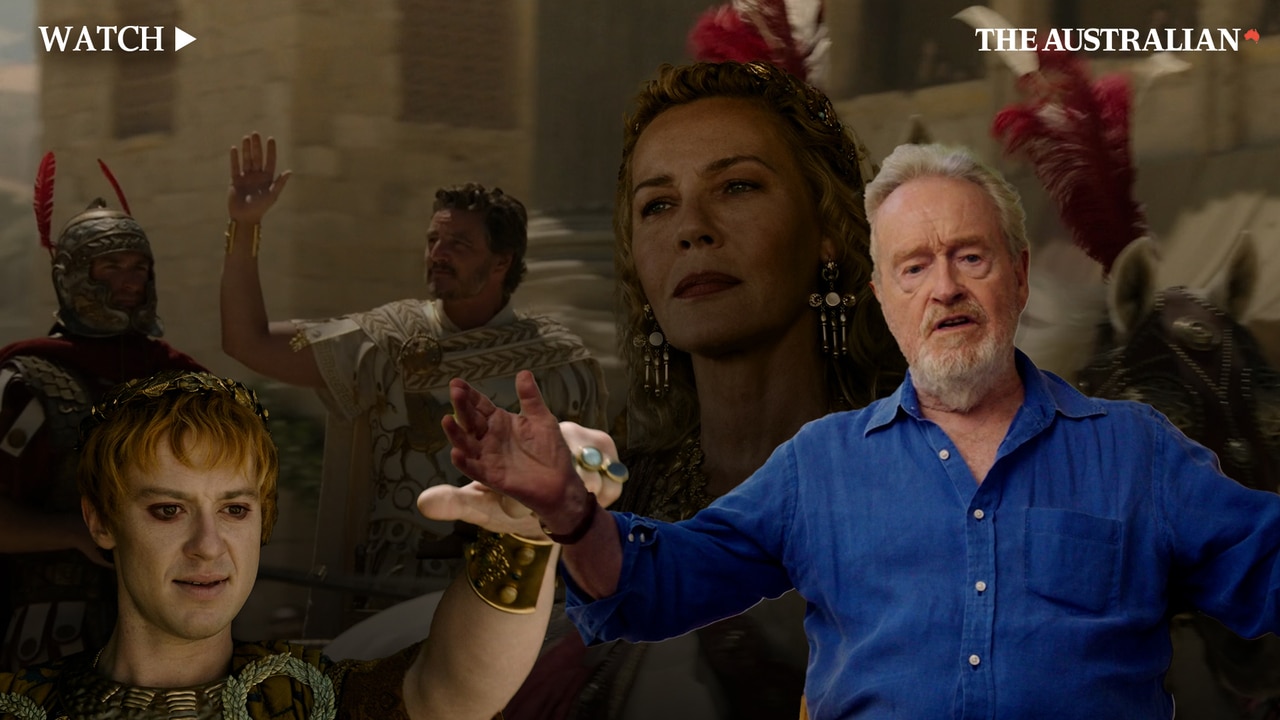
Mescal’s nose, along with the rest of him, is on a poster for the film arranged behind the actor when we speak. In the image, Mescal kneels down in a leather kilt to run his hands through the dirt of the arena. This is the exact move trademarked in the original by the man revealed in the sequel as his father, the gladiator Maximus Decimus Meridius, played by Our Rusty. Mescal twists around in his chair to look at it, and is silent for a long moment. And then he laughs. “I can see the amount of chicken breasts that I had to eat, and the amount of squats that had to go into that,” he jokes.
For this cover story, I spoke with Mescal as well as Gladiator II’s impresario, the indomitable filmmaker Sir Ridley Scott, 86, about the pair’s partnership to follow up the blockbuster from 2000. Our conversations traverse talent, filmmaking alchemy, story and legend. (At one point, Scott also demonstrates to me what happened to Mescal while beefing up for the role, imitating the Michelin man. “Boom!” Scott bellows. “He came up fast. At that age, you do,” he adds, wistfully.)
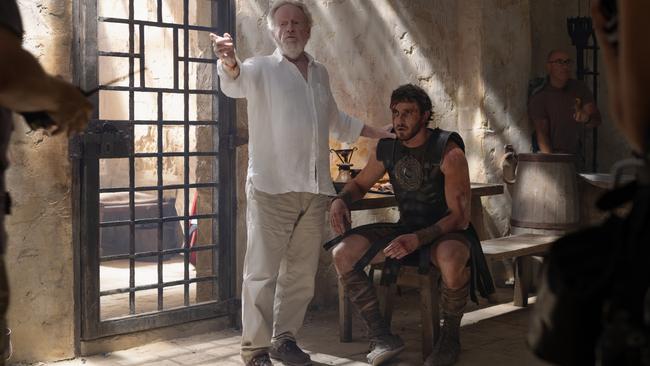
Looking at the poster puts Mescal in a ruminative mood. “We’re still in the precious between bit,” he admits. We are talking in early September, two months before the film will be unleashed. Since wrapping Gladiator II at the start of the year – the devil works hard, but Sir Ridley Scott works harder! – Mescal has returned to what had previously been his sweet spot of tiny, tender cinema. He is currently in production on Hamnet, an adaptation of Maggie O’Farrell’s acclaimed Shakespearean novel, which brings his credits to a total of just nine movies. Before Gladiator II, Mescal’s most expensive production was last year’s romantic drama All Of Us Strangers, which was made for $US5 million; Gladiator II has a reported budget some 62 times that, at $US310 million.
Courtesy of the miniseries Normal People, released in 2020 in the isolated, febrile early days of the pandemic, Mescal is undoubtedly famous, especially among a particular subset of people who read novels by Sally Rooney (the author of Normal People) and listen to music by Phoebe Bridgers (she is Mescal’s ex girlfriend). But despite his status as the internet’s cherished boyfriend, he has managed to retain the kind of under-the-radar vibe that allows him to get lost in the crowds at Glastonbury, which is where he was in July with Daisy Edgar-Jones (Marianne to his Connell) and Saoirse Ronan, with whom he made the sci-fi movie Foe in Melbourne.
Mescal has made a career out of playing fragile and fractured men, but he’s excellent company, laughing easily and a lot, and almost always at his own expense. ("I’m off to a great start,” he groans after revealing his preference for Melbourne over Sydney, which is the wrong answer.) Though I am certain he would much rather be spending his Saturday doing quite literally anything else other than an interview about a movie that might pierce his plausible anonymity forever, he never lets that on, which is very polite of him. Much like Crowe, who became an Academy Award winner and a tabloid fixture faster than he could bellow “unleash hell”, Mescal is on the precipice of something altogether more overwhelming.
“That’s probably the thing that I’m most nervous for, actually. The global access point that I’ve managed to avoid, and been very content with that, actually, up until this point,” he says. “This is something that feels different.” For a moment he looks stricken, and then he gathers himself, shoulders squared. “Cross that bridge when I get to it,” he concludes, gamely.
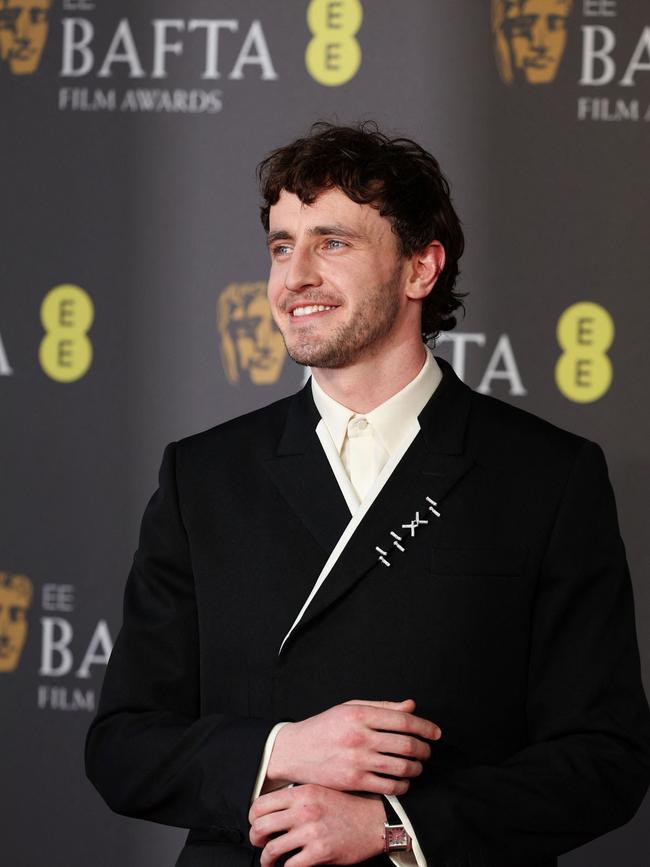
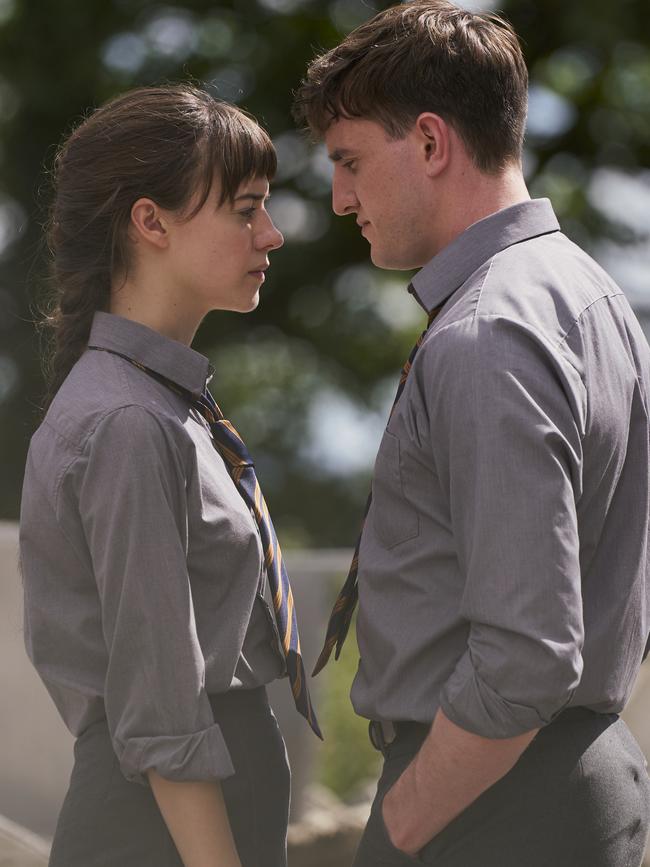
Douglas Wick, producer of both the original and its much anticipated sequel, remembers going to dinner with Scott and Crowe after an early screening of Gladiator. Fans were leaning over Crowe to get to Scott, completely bypassing the actor. “After next weekend, that’s the last time in your life that will ever happen,” Scott told him. Wick has relayed this exact story to Mescal; in fact, the producer just had a meeting about the film’s marketing campaign, which is set to take on epic proportions. “I texted him yesterday,” Wick tells me. “I said, ‘It’s as if they wanna ruin your life.’”
Well, well, well, if it isn’t Sir Ridley Scott! The filmmaker appears on my computer screen under a frescoed ceiling, framed by three columned arches, wearing a snug T-shirt the colour of an olive grove. The effect is dazzling, and more than a little bit Roman, though in fact Scott is just at home in Los Angeles. It would appear that his famously puckish energy entered the (many splendoured) room long before he did. My first question is why the time is right for this sequel. Scott peers imperiously at me for a beat before breaking into a million dollar grin. “It’s always time for a good movie.”
Scott is his own biggest fan. Of filmmaking, he proffers the following: “The script is a Formula 1, and I’m a Formula 1 driver. I’m a good one, I know that.” Asked the last great thing he’s seen, Scott laments that “there’s not a lot of great around, dude”, before flashing that grin again: “My long version of Napoleon.” (When this is repeated to Mescal, he tips his head back in glee and says: “And that’s why we love him!”)
Humble, thy name is not Sir Ridley Scott. But why should it be? Born in 1937 and forged in the world of advertising before directing his first film at 40 – his second was Alien, his third, Blade Runner; two of the best blockbusters ever made – Scott is today heralded as one of the most influential filmmakers of all time. Genre agnostic, he zips from period drama to sci-fi to feminist road movie, his prodigious output characterised by a union between story and spectacle, one occasionally to the detriment of the other. A word Scott often uses to describe his career is intuition. “That’s why my choice of material seems to be random,” he explains. “[I choose] a story, which may have no relation to anything I’ve done before. In fact, that’s one of the things I like to do, just not repeat myself.”
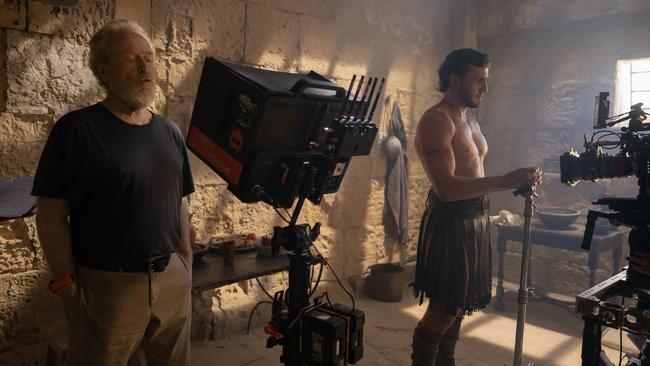
Until he does. After losing control of two franchises, Scott was determined to hold onto Gladiator. (Alien’s sequels were directed by James Cameron and David Fincher before Scott swooped back in for a couple of prequels, and Blade Runner’s reboot was made by Denis Villeneuve.) “I’ve lost too many of my franchises to other people later on, I should never have let it go,” he admits. And he always had an inkling that he might return to the coliseum. “It’s so successful, why the hell not?” he declares. “It struck such an emotional chord with audiences, people kept telling me that it was their favourite film for 20 years.” But finding the right story took time, given the finality of the original’s ending, in which Maximus dies. “Clearly, it should be about Lucius,” Scott decided. And, with the exception of a few flashbacks, Crowe is not in the film – “He’s dead!” Scott exclaims, when I bring up his absence – though his spectre hangs over the whole enterprise like a suit of armour.
When Scott first eyed Gladiator, his friend, the director Michael Mann, warned him off the project. “Everyone’s snickering because it’s a sword-and-spear movie with leather skirts,” Mann said. But if Scott insisted on making the movie, Mann suggested he take a look at the film he had in production. It was called The Insider, and it starred a young Russell Crowe as Jeffrey Wigand, a former Big Tobacco executive taking a stand against the industry. Physically, there is no resemblance between the characters of Wigand and Maximus Decimus Meridius. But they share Crowe’s solemn righteousness, which in Maximus’ case is laced with danger. Scott and Crowe got on so well that they ended up making five films together. “He is one of the boys. And so am I,” beams Scott. “Russell likes a bit of fun and never carries his talent on his shoulder. He just is what he is. And he’s a magnificent actor.”
Still, Crowe had to be talked into doing Gladiator. “Frankly, when I got the script, it wasn’t very good,” Crowe said at the time. “I nearly passed.” Scott admits the production was laborious. “There’s no question we started off and it was pretty thin,” he says. “Russell knew it, and of course I knew it.” But they had a greenlight and so off they went, rewriting on the go. “The danger is when you start off with a great, perfect script, and you make the movie thinking, ‘God, didn’t we do a good job?’ And the film is kind of flaccid. Because you weren’t paying attention,” Scott explains. “You’ve got to be paying attention all the time, and that, with Russell, was hard work doing.”
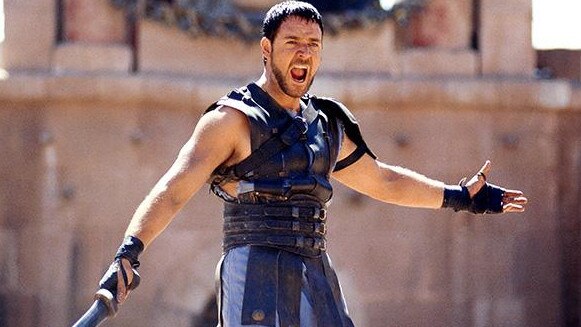
Connie Nielsen, who stars in both the original and the sequel as Lucilla, Maximus’ former lover, remembers sitting on the phone with Crowe the night before their scenes, “just going through the lines and saying, ‘Well, remember version 17? Should we take that from that version there, and then put this in from this one?’” The hard work was worth it; the result is one of the best movies either man has ever made. Crowe’s riveting intensity grounded Scott’s proclivity for spectacle. And Scott’s eye for entertainment made Crowe into a movie star.
Mescal did not need to be talked into doing Gladiator II – “There was no doubt in my mind” – and Scott admits that “our journey was easier on number two than number one”. Mescal was cast after Scott watched him as the casually magnetic Connell in Normal People. “I thought, who is this guy who reminds me of Richard Harris?” remembers Scott, referring to the late Irish actor who starred in Gladiator as Emperor Marcus Aurelius. He was the only person Scott considered for the role of Lucius; there was no endless parade of auditions. “I tend not to do that for a leading man or woman,” says Scott, pointing again to his intuition. “I chose him.”
Mescal loved the original when he first saw it as a teenager. But he decided against speaking to Crowe before production because, as he has said, the characters are “totally separate”. He still hasn’t talked to Crowe. “I haven’t spoken [to him]. I’ve been shooting,” he explains. “But I’d love to cross paths with him at some point.”
Scott sees much that his two gladiators share. “Masculinity,” he begins. “Forthright. A natural leader. That’s built in – you don’t act that.” Lucy Fisher, producer on Gladiator II and Wick’s wife, remembers driving around Los Angeles on opening weekend in 2000 to see the crowds lining up. On the first night, it was all men. “The roughest gangs,” she recalls, “they practically had whips and chains… it was a tiny bit scary.” But on the second night, when news of Crowe’s heartfelt performance got out, women flocked to cinemas. “His gravitas, his honour, made them all want to dump their current boyfriends,” Wick remembers. After Gladiator, Crowe became a global heart-throb; his name was invoked as Carrie Bradshaw’s ultimate fantasy in Sex and the City. With Gladiator II, Mescal takes his place. “He can convey both the reflective side of a man, the more sensitive, tender, vulnerable side, and he can also convey the more rageful, virile side,” Fisher sums up. “It’s almost like what people want the modern man to be.”
Here is a good story. Mescal arrived on theset of Gladiator II in June 2023, having dutifully consumed what was to become his customary four chicken breasts before noon, and readied himself for battle. He was, he can admit it now, a little on edge. His first day was filming the opening, where Lucius is blessed before war against the Romans. Mescal was kept on ice in a tent, hidden away as the set was prepared – “I think consciously by Ridley,” he adds. Scott barged in, cigar clamped between his fingers, and surveyed his gladiator. “Are you nervous?” he demanded. “And then I remember him just whacking me on the back going, ‘Your nerves are no good to me.’” It was, Mescal says, a gift. All his anxieties melted away. “Weirdly, I felt incredibly calm once we got into the work of it.”
The son of a police officer and a teacher, Mescal grew up playing Gaelic football until a broken jaw coincided with drama school and he had to choose between his passions. “I know what it’s like to throw my body around,” he says, and he really threw himself into Gladiator II. “A lot of cuts, and I had a strain in my glute that was pretty niggly,” he breezily recounts. “Nothing super gnarly, thankfully.” But by the end of production, he felt a bone-deep, inescapable weariness. He was spent. “My body was absolutely f..ked,” he admits. “It’s feeling what has happened to it. It’s been thrown around in the ground, big stuntmen running over me… And it’s also the emotional catharsis of stepping into something that was new territory for me, and being proud of what I achieved.” And yet, you’ve never seen a man enjoying himself as much as Mescal when he fights a rampaging rhinoceros in the belly of the coliseum. “Time of my life!” he grins, and I believe him.
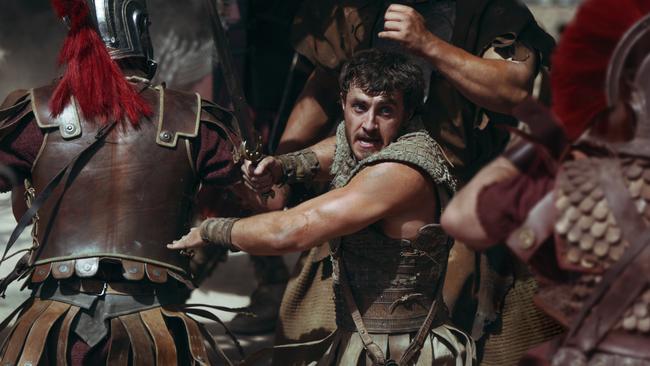
The secret of Gladiator is that the best action sequence actually takes place away from the coliseum, in the provincial arena where Maximus first fights. Crowe strides in and dispatches four opponents in a brutal clamour of steel, hurling his sword into the crowd and roaring the film’s most famous line: “Are you not entertained?”
Gladiator II pulls the exact same trick, and if Mescal’s performance wasn’t so ferocious Scott wouldn’t get away with it. Years ago, Scott saw harrowing real-life footage of a baboon attack. When it came to brainstorming potential animal adversaries for Gladiator II – “Panther? Boring!” – he remembered the viciousness of that video. “They’ll bite you. They’ll eat you,” Scott says, not without a little excitement. In the film, it’s Mescal who eats them, ending his first fight as a gladiator by biting into a baboon’s arm. Not much can shock an audience in this post-Game of Thrones era, but seeing Mescal on all fours, blood dripping down his chin, will do it. “It’s such an amazing sequence,” Mescal agrees. “But when I read it in the script, to be fully transparent, I was like, ‘We’re going to have to talk about the baboons … Like, what the f..k is going on?’” His hesitation was short-lived. “I think there is only one director in the world that can make that work, and it’s Ridley Scott. That is his idea. That is his brain.”
At first glance, Mescal and Scott seem like an odd couple: the former is an actor who has previously done intimate, unshowy work for indie directors such as Charlotte Wells in her father-daughter drama Aftersun, for which he got an Oscar nomination; the latter is Mr Bombastic. But Mescal disagrees. The scale might be different, but the intention is the same. “I’ve been very lucky that, whilst working, I’ve always had a role within the film which has allowed a very close relationship to the director,” he explains. “I can fully, comfortably say that Ridley’s one of my good friends.”
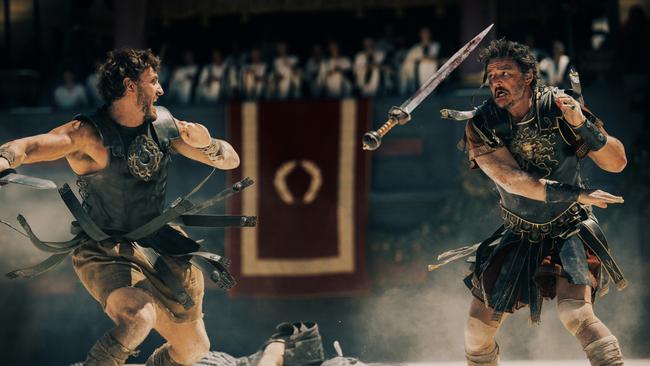
Production stretched out for almost a year, with a four-month pause for the actor’s strike. Mescal went home to London and alternated between training to ensure he stayed fit and anxiously scrolling on his phone. “Going down blind alleys of like, ‘OK, I think there’s another 48 hours in this strike, and they’re gonna sit down at the table again, and that means I’ll be back in a week’. That was a bit of a head f..k.” It was a “massive relief” when work resumed in November. “It was also just great to see Ridley again,” he admits.
Nothing makes Mescal happier than “hearing Ridley tell stories, smoking a cigar with him… and seeing how his brain works”. These are, he says, “some of my favourite moments that I’ve had in my life, let alone filming”.
For all his pent-up characters, Mescal’s gift is the way he makes himself accessible to the audience. How his emotions are always right there on the surface, so candid and close. There is a specificity to his screen presence: what is happening to this person is exact, and real. Even in the gladiatorial arena.
Mescal is known for a certain onscreen sadness, and while his character Lucius has much to grieve – his wife slain, himself enslaved – it is rage that agitates him in Gladiator II. “Rage pours out of you like milk,” notes Denzel Washington’s Macrinus, eyeing up Lucius like a first draft pick. (Washington’s gilded, swaggering turn as a gladiator master by way of Yonkers is such a high-wattage thrill, it would overwhelm most actors. But not Mescal.) “I think rage is completely contained within all of us,” Mescal muses. “It’s definitely something that I can access and think is very useful when used correctly, and this was a great opportunity to dial that up to a hundred.” Mescal asked himself: How would Lucius survive? “You don’t survive the coliseum by thinking your way through it. You survive by getting the bit between your teeth and being relentless.”
The result is a powerhouse performance, and completely distinct from the original. It is also proof, if anyone needed it, that Mescal can do anything. He moves with intention and twirls a sword with such light-footed grace. And Mescal laughs in the movie. A lot. The kind of sly, high-spirited laughter he is known for off-screen. “It’s not interesting to see a character for two and a half hours just be angry,” the actor explains. “It doesn’t work.” Where Crowe’s Maximus was cloaked in misery, Mescal plays Lucius like he’s in a blind fury, which takes over when he’s in the arena and evaporates when he’s not.
Crowe won an Oscar for his performance in Gladiator. Could Mescal? “Oh yes,” affirms Scott. (He later mumbles, “well, I’ve been nominated five times”. Scott has never won an Oscar. And also, he’s actually been nominated four times.) Not only does Scott want to work with Mescal again, they’ve already lined up their next project. “I’m not going to tell you what it is, though,” Scott says, eyeing me warily.
“We’re talking about a couple of things,” Mescal offers, diplomatically.
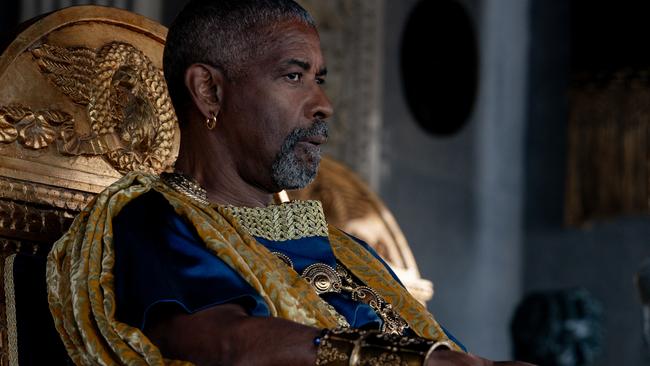
Both men have seen the film. Scott believes it’s one of his best. “The package. The overall look of it,” he elaborates. “You know when you’ve got something. I knew I had something with Alien. And I knew I had something very special with Blade Runner.” Adds Mescal: “I think it’s brilliant… It’s one of my favourite films of his, and it’s one of mine, as well.”
Scott once described his ultimate role as entertaining the audience. Is that more difficult to do these days? “They binge on this,” Scott bemoans, holding up his smartphone. “This is a disaster. This should be taken away from children. This should not be allowed in schools… Go climb a tree! Go half-drown in the sea, go and learn who you are!”
At 86, his passion to entertain is undimmed. “Orson Welles said a great thing, he said being a film director is the best train set a boy could ever have,” he reflects. “Yeah, it still excites me.” He has already teased the potential for Gladiator III.
“It’ll only happen like this one, if we get a fantastic script, which we’re far, far away from,” cautions Wick. But as Fisher adds: “Never bet against Ridley!”
Mescal is upfront about what the future looks like for him. “Films like Gladiator will be the anomaly for me,” he says. He has a fortnight left on Hamnet, and emits cautious pride. “I have this weird superstition where I don’t really want to talk about it, but it’s feeling like it’s exactly what we were setting out to make,” he says. “Something that feels really moving.”
After that, a global press tour for Gladiator II begins next week in Sydney and then… “More acting,” he answers, swiftly. To be clear, he’s looking forward to a break, but after a few days he always finds himself itching to get back to work. “I’ve a very complicated relationship to the word ‘holiday’,” he laughs. “I like them in short, sharp bursts. But I also get incredibly anxious on them and I don’t really, fundamentally, understand them… Maybe as I’m getting older I’ll start to embrace them.” Or maybe not. For Mescal, acting is “like an addiction”. “It’s a feeling of, ‘I have to do it’,” he stresses. In this life or the next.
Gladiator II is in cinemas from November 14.


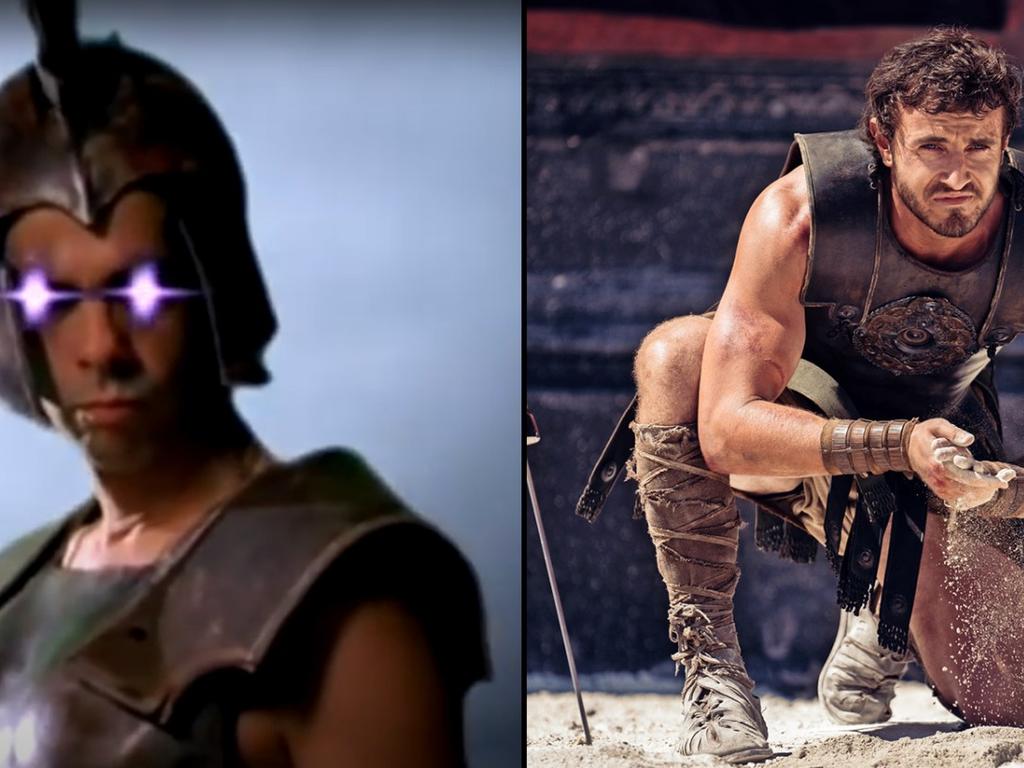
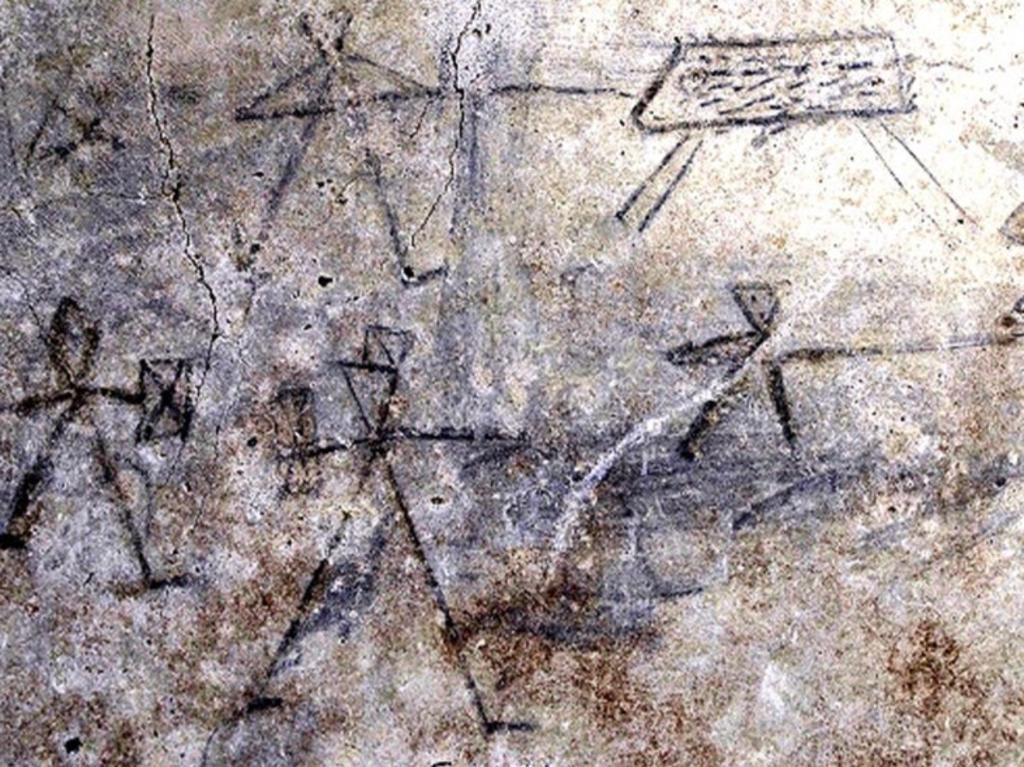
To join the conversation, please log in. Don't have an account? Register
Join the conversation, you are commenting as Logout